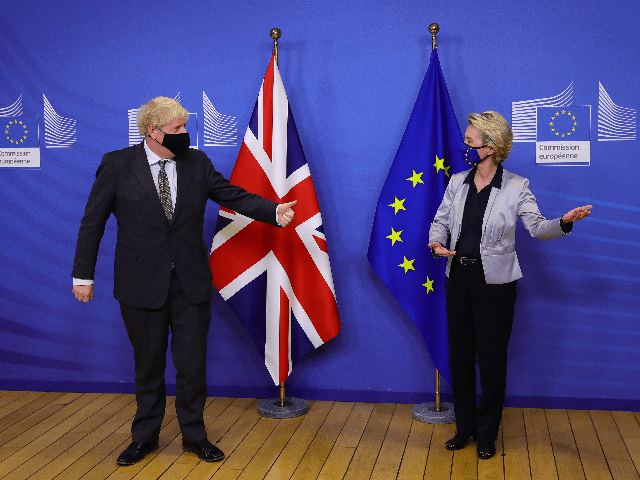The British government is willing to “move on” from the European Union’s aborted effort to impose a hard border between EU Ireland and British Northern Ireland and help Brussels overcome its vaccine failures.
Britain has far outperformed the European Union on vaccines after opting out joint procurement — a decision heavily criticised by EU loyalists and some supposed health experts when it was made — with the bloc taking much longer to approve, order, and administer inoculations.
It has had particular difficulty with the Oxford/AstraZeneca vaccine, which it has only just approved, due to problems at EU plants, and has been demanding UK-made doses of the vaccine are diverted to it and threatening to seize UK-purchased vaccines made in the EU to make up the shortfall.
This slow-motion disaster reached its zenith (so far) with Brussels’ announcement that it would be overriding part of the EU-UK deal on Northern Ireland which it had itself demanded in order to impose a hard border on the British province and stop vaccine exports — a move they had previously claimed was unthinkable, and one which they unveiled without reference to the Irish government.
Following a three-way diplomatic row and a humiliating U-turn, however, the British government has signalled that it is willing to “move on” from what the First Minister of Northern Ireland described as an “incredible act of hostility” and help the EU overcome its problems, the Telegraph reports.
“This is about collaboration, which is why we went out of our way to help with the production challenges in Holland that they were facing before Christmas and will continue to do so,” said vaccines minister Nadhim Zahawi, referring to the fact that Britain sent engineers to a Dutch vaccines plant that was having issues with production.
“We want to work with our friends and neighbours in the European Union. We recognise some of the difficulties and the pressures they face. But the decision yesterday to [try and impose a hard border on Northern Ireland], that was a mistake and that’s been acknowledged,” added key Cabinet minister Michael Gove.
“Now we can move on and we can ensure that the issues which the people of Northern Ireland are legitimately concerned about can be addressed. I’ve spoken to the European Commission vice-president about this, and we both agree that we need a reset and put the people of Northern Ireland first,” he said.
Things were headed in a rather different direction before the EU backed down on Northern Ireland, with the British government reportedly discussing a raft of countermeasures.
“The Irish did not know about it. The Irish government, ourselves and the U.S. government – everyone was shocked,” one minister told the Telegraph.
“There were a variety of things set out that were not needed. Things moved very rapidly. There was a paper drawn up with actions to respond, but thankfully it all got stood down,” a government source told the newspaper, which heard that the government considered using the European Commission, ditching some of its own concesson to the bloc on Northern Ireland, and even arranging airlifts to circumvent a potential blockade.
“The European project has been found horribly wanting by the pandemic. The crisis has brutally exposed its deep faultlines of massive, ponderous bureaucracy and decisions taken for EU protectionism and corporate advantage rather than the welfare of its own citizens, who are now rightfully furious with their inept political masters,” commented Mark Francois, a senior Tory Brexiteer, on the ugly saga, which he took as proof that the British government must consider redrawing or outright replacing its deal with the EU on Northern Ireland.

COMMENTS
Please let us know if you're having issues with commenting.